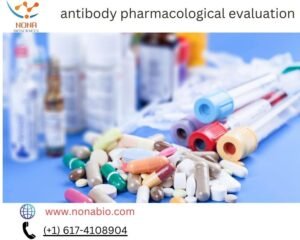In the dynamic landscape of biopharmaceutical development, the pharmacological evaluation of antibodies holds paramount importance in assessing their efficacy, safety, and therapeutic potential. Nona Biosciences, a pioneering force in antibody discovery and development, employs a comprehensive approach to pharmacological evaluation, integrating rigorous testing methodologies with state-of-the-art technologies to advance the field of medicine.
At the heart of Nona Biosciences’ antibody pharmacological evaluation process lies a commitment to ensuring the safety and efficacy of therapeutic antibodies. Leveraging a multidisciplinary team of scientists, pharmacologists, and clinicians, the company conducts thorough preclinical assessments to elucidate the pharmacokinetic (PK) and pharmacodynamic (PD) properties of candidate antibodies. This involves evaluating factors such as antibody half-life, tissue distribution, target engagement, and mechanism of action, providing invaluable insights into their therapeutic potential.
Nona Biosciences employs a variety of in vitro and in vivo models to assess the pharmacological profile of antibodies. In vitro studies encompass a range of assays designed to evaluate antibody binding affinity, specificity, and functional activity against the intended target. These assays may include enzyme-linked immunosorbent assays (ELISA), surface plasmon resonance (SPR), and cell-based assays, among others. By interrogating the interaction between antibodies and their targets at the molecular level, Nona Biosciences gains critical insights into their biological activity and potential therapeutic effects.
In parallel, in vivo studies play a pivotal role in characterizing the pharmacokinetics and pharmacodynamics of therapeutic antibodies in relevant animal models. These studies involve administering candidate antibodies to animal subjects and monitoring parameters such as serum concentration over time, tissue distribution, and pharmacological response. By correlating these data with efficacy and safety endpoints, Nona Biosciences can make informed decisions regarding the advancement of lead candidates into clinical development.
Furthermore, Nona Biosciences prioritizes the implementation of translational pharmacology strategies to bridge the gap between preclinical findings and clinical outcomes. This involves leveraging biomarkers and predictive models to extrapolate preclinical data to the human setting, facilitating the design of robust clinical trials and the identification of patient populations most likely to benefit from antibody-based therapies.
The antibody pharmacological evaluation conducted by Nona Biosciences is not merely a regulatory requirement but serves as a cornerstone of its commitment to delivering transformative therapeutics to patients in need. By employing a rigorous and systematic approach to assessing the pharmacological properties of antibodies, Nona Biosciences accelerates the development of novel biologics with the potential to address unmet medical needs across a spectrum of diseases.
In conclusion, Nona Biosciences’ antibody pharmacological evaluation process represents a convergence of scientific expertise, cutting-edge technologies, and a patient-centric approach to drug development. By meticulously characterizing the pharmacokinetic and pharmacodynamic properties of therapeutic antibodies, Nona Biosciences paves the way for the translation of innovative biologics from the laboratory to the clinic, ultimately improving patient outcomes and advancing the standard of care in modern medicine.



